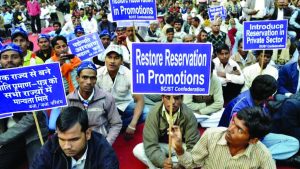 In the ongoing hearing of pleas on whether reservations for SC/ST candidates should extend to promotions or not, the Supreme Court has asked whether the conjecture behind those arguing in favour was that SCs/STs will remain perpetually backward. While failure of the reservations in palliating the condition of the beneficiaries makes this question reasonable, conversely, if the belief is that reservations have been helpful, as can be discerned from the bulk of evidence, then reservations should be applicable only until the beneficiary needs them, not forever. In other words, as one expert points out, “reservations without de-reservations are meaningless and self-defeating.
In the ongoing hearing of pleas on whether reservations for SC/ST candidates should extend to promotions or not, the Supreme Court has asked whether the conjecture behind those arguing in favour was that SCs/STs will remain perpetually backward. While failure of the reservations in palliating the condition of the beneficiaries makes this question reasonable, conversely, if the belief is that reservations have been helpful, as can be discerned from the bulk of evidence, then reservations should be applicable only until the beneficiary needs them, not forever. In other words, as one expert points out, “reservations without de-reservations are meaningless and self-defeating.
In recent years, many states have witnessed spate of agitations staking reservation claims — Marathas in Maharashtra, Kappus in Andhra Pradesh, Jats in Haryana and Patidars in Gujarat. Underlying political overtones dictated by “vote-bank” politics elicit support from all political quarters. Political parties have learnt to accommodate these demands lest their votes be affected, resulting in phenomenal growth in such demands, so too unrest and even violence in quota stirs. Remedial judicial interventions in accordance with constitutional propriety are undone by overriding political interests by amending the Constitution paving way for further quota stirs and such a scenario calls for serious focus on creamy layer.
Creamy layer
While upholding the salience and necessity of reservations at entry level for SCs/STS, the apex court questioned whether these reservations should be used for speedy or special promotion channels in addition to being extended generation after generation. In view of the fact that “creamy layer” indicators are already in place that are applicable to OBCs, the Supreme Court in the ongoing hearings has asked whether something similar should be applicable to SCs/STs or not.
According to media reports, the term “creamy layer” was first coined by late Justice Krishna Iyer in State of Kerala vs NM Thomas, wherein he observed that “benefits of the reservation shall be snatched away by the top creamy layer of the backward class, thus leaving the weakest among the weak and leaving the fortunate layers to consume the whole cake”. While dealing with creamy layer at length, the Supreme Court in Indra Sawhney vs Union of India, stressed that in the event of member of a backward class having reached an advanced social level or status, he/she would no longer belong to the backward class and would have to be removed from the reservation list.
However, Article 16(4) of the Constitution stipulates that the State must identify the creamy layer in a backward class and thereafter excluding the creamy layer extend the benefit of reservation to the ‘class’ which remains after such exclusion. However, extension of creamy layer parameter of ‘OBC’ to SCs/STs has now become a debatable issue.
Protagonists opine that denial of reservations to the creamy layer will tantamount to denying reservation to the entire community. Nevertheless, it is argued by the opponents that implementation of creamy layer policy would help reservation benefits percolate to the most deprived and deserving members of that community. Some experts support reservation for the creamy layer in SC/ST category by arguing that depriving such creamy layer of the benefits of reservation could result in their seclusion from their own community leading to disinterestedness in their own community. However, other experts opine that extending direct benefits to the poor of SC/ST could be a better option than passing on the benefits to the creamy layer because the former could help the poor of their own community.
Some critics caution that any change in the reservation policy, including creamy layer, in the SC/ST category could halt their upward ascendance on the trajectory of growth garnered with much difficulty over the past few decades through reservation. According to a news item published in leading English daily dated September 6, 2012, by 2011 in the Central Government, of a total of 149 secretary-level officers, there were no SC officers and there were only 4 ST officers. At the additional secretary level, out of 108 officers, there were just two each from SC and ST. At the joint secretary level, out of 477 officers, SCs accounted for 6.5 per cent whereas ST constituted 3.1 per cent. Out of 590 directors’ posts, only 17 vacancies were filled by SC and seven were allocated to ST. This data makes it discernible inability of SC/ST candidates facing difficulties in making to the top posts and calls for remedial measures to ensure equitable opportunities for SCs/STs.
Political machination
Undeniably, political parties have often used reservation as a trump card to secure and enrich their vote bank. Quota agitations — be it by Marathas in Maharashtra, or Jats in Haryana or Patidars in Gujarat — are often seen by political parties as opportune occasions to enrich their respective vote banks. Faulty development policies, inadequate facilities and lack of infrastructure for technical education and skill development, sordid state of affairs afflicting the unorganized sector etc., have proved instrumental in limiting the scope of job creations thereby leading to huge disparity between the growing population and job opportunities. The yawning gulf between demand and supply of jobs spurs those outside the reservation category to demand reservation and the vested political interests exploit the situation to their advantage thereby making gullible people fall a prey to divisive politics and resultant unrest.
Almost all political parties are well aware that reservation is not the only panacea to improve the condition of the poor and the backward as Government sector provides less than 4 per cent of total jobs in India. Still these parties grind their own axe at the expense of gullible people. As one critic has aptly observed, “The problem is that the political investment in caste is an almost insurmountable obstacle not only to social transformation but also to legal reform.” It is high time that political parties should shun caste politics, especially on reservation issue.
Way forward
Agreeably, there is no overnight solution to the problem of reservations, especially in the wake of complex socio-cultural and religious-ethnic structures of the Indian society. Overall equitable, inclusive and sustainable economic growth in which benefits trickle down to the last person at the lowest rung of the society entails sanguinity of finding a way out of this caste-ridden quagmire. Government, from central to municipal level, is called upon to fill up vacant vacancies and generate new opportunities in government jobs as well as self-employment. Besides, specific emphasis needs to be focused on adhering to correction course to undo the ill-effects of demonetization and wrong implementation of the GST on medium and small-scale sector, which is admittedly the largest employment provider.
There is also need to pay heed to sane advice offered by one critic, “We need to ask ourselves, once again, whether it is equality of opportunity that we strive for, or whether we want to rid our society of the caste system.”
Some observers have suggested implementation of creamy layer system in all types of reservations in India including SCs/STsbecause it will help further filtering in the system and allocate the available facilities to the neediest. However, such a suggestion cannot be implemented without the consensus of all concerned and such a consensus to obtain immediately is a herculean task; nevertheless, initiative can be launched through persuasion.
It is interesting here to cite the exemplary instance of Sujat Ambedkar, the great grandson of the legendary Babasaheb Ambedkar, who recently startled a predominantly Dalit rally by announcing that his privileged upbringing did away with the need for reservation. Sujat may be a rare but inspiring exampleof self-abnegation in SC/ST communities and his example needs to be emulated by well-off segments in these communities to voluntarily renounce their privileges in favour of those who need them more direly.
letters@tehelka.com












